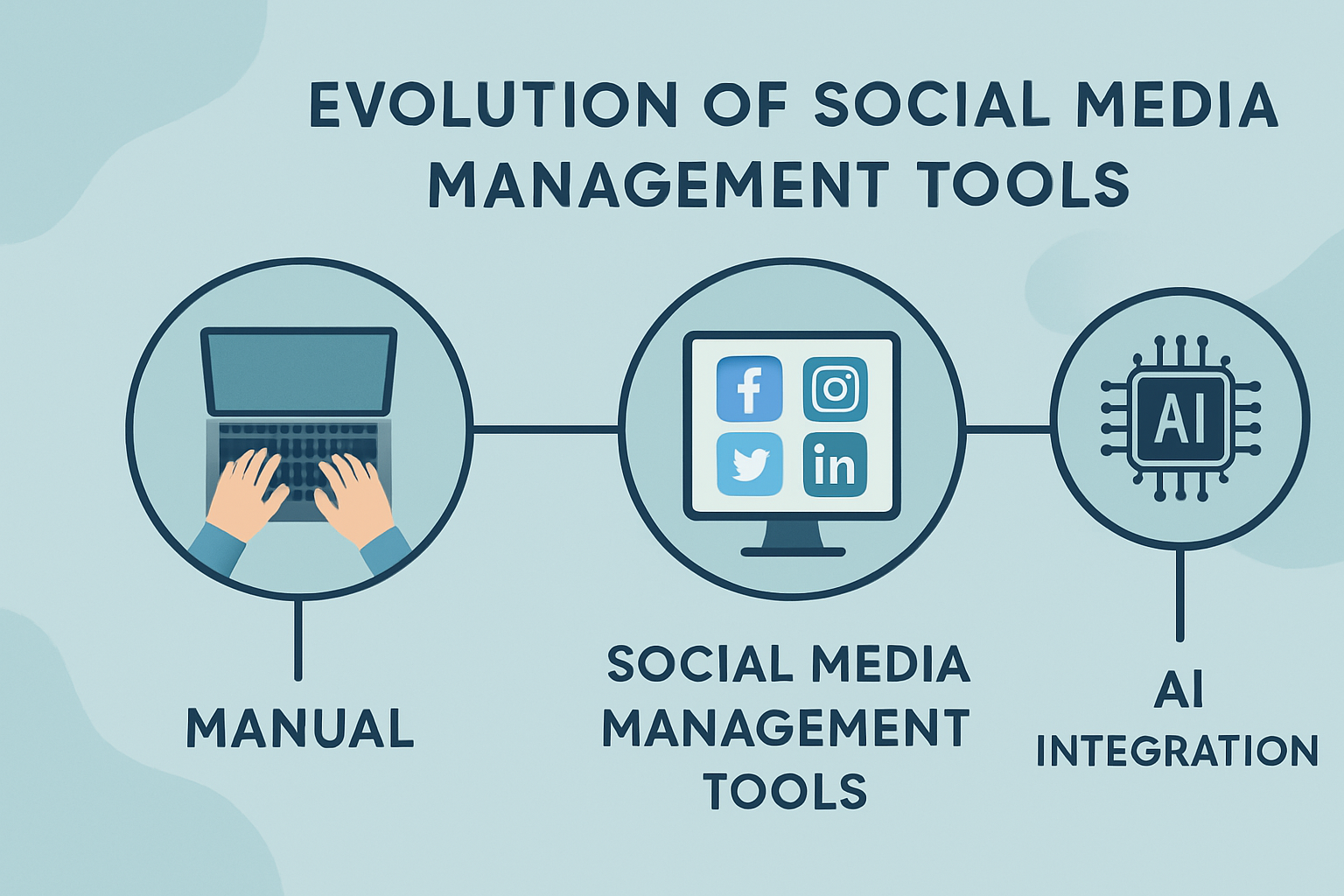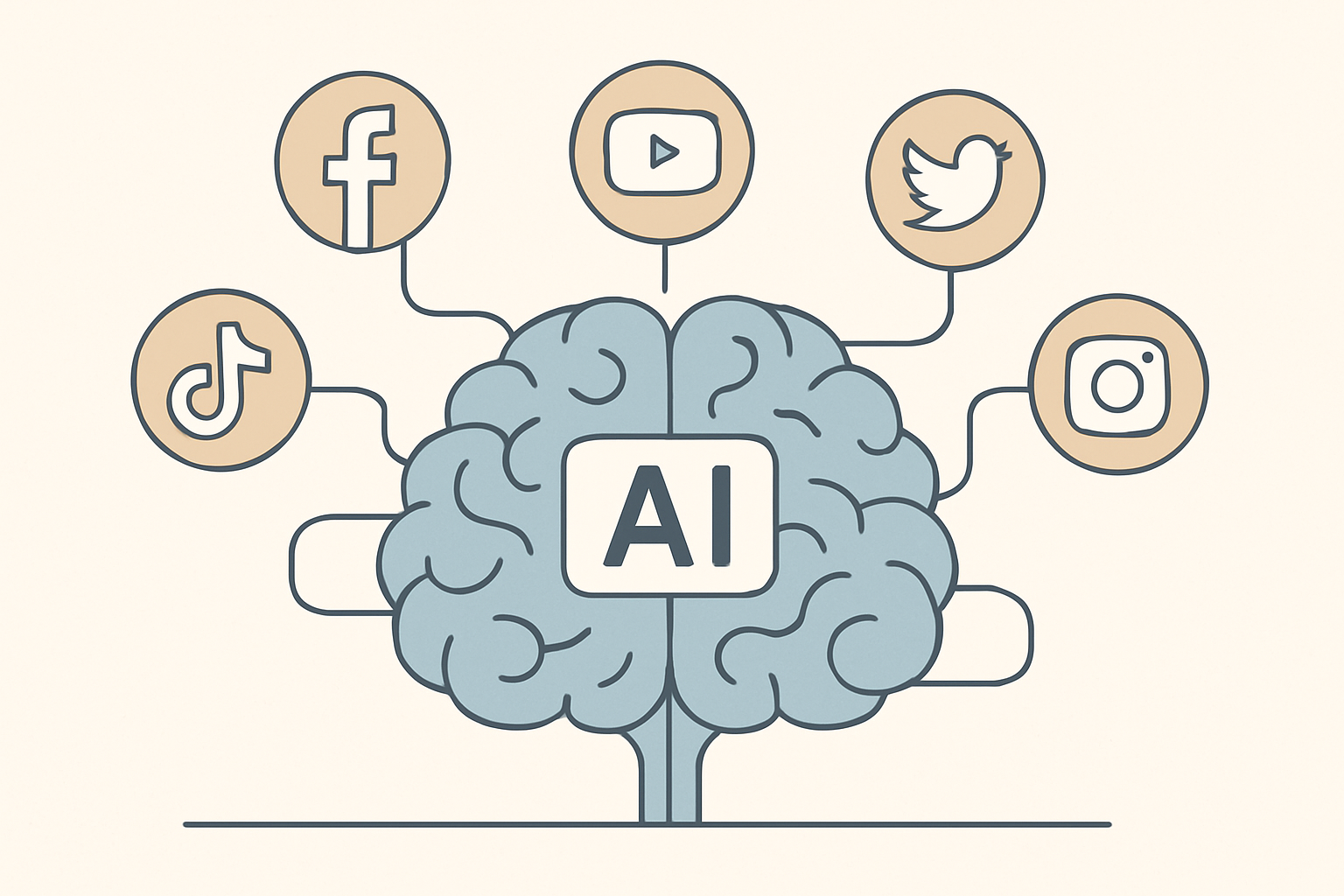
Social media is changing very fast these days. This is because of new ideas in artificial intelligence. AI is changing the digital landscape in a big way. Many businesses now use AI tools like Kleo to get better at making smarter decisions. These tools also help them come up with better strategies. The future of social media will be all about using what AI shows to help people get what they want. This will make content creation quicker, and companies will reach the right people more. It also helps boost user engagement in a big way. In this blog, you will see how AI gives brands and users a more personal and active digital world.
The Evolution of Social Media Management

The way people do social media management has changed a lot over time. At first, it was done by hand and often used trial and error. Now, things are different. The use of data helps digital marketers. They can look at historical data to see what works and what does not. With artificial intelligence, businesses can grow quicker and find their audience in a better way. This also lets people fine-tune marketing campaigns with a sharp focus.
At the same time, adding artificial intelligence lets companies look closer at user behavior. This helps businesses act fast when market trends change. Even with all these new tools, people still play a key part in making the important choices.
From Manual Processes to Automation
At first, social media platforms were hard to manage. People had to do everything by hand, and this made the work slow and not very good. Scheduling posts was a guess, and customer engagement took a lot of one-on-one time. Now, things are very different with machine learning and automation using algorithms.
With automation tools, brands can set up posts to go out at optimal times. This helps the right audience see the content when they are most active. AI also fits well with content creation, coming up with new ideas that match changing customer preferences.
AI systems have made more progress and now can spot trends in user behavior very fast. This helps marketers change how they respond and reach customer engagement goals, or run focused campaigns for the right people. Automation takes away boring work, so teams can use their time for big plans and telling better stories. This means they can also make quicker choices. Automation is not only making work easier—it is also improving long-term plans by mixing day-to-day jobs with what the customers really want, as things keep changing.
Key Milestones in AI Integration
AI’s journey into social media management has been marked by defining milestones. Initially introduced for automating mundane tasks, AI systems began evolving into sophisticated tools capable of predicting market dynamics.
|
Milestone Integration Year |
AI Innovation |
Description |
|
2012 – Early Adoption |
Sentiment Analysis |
Introduction of tools to gauge public sentiment online. |
|
2016 – Automation Expansion |
Chatbots |
AI-driven assistance for scalable customer queries. |
|
2022 – Content Enhancement |
Generative AI |
Creating tailored posts, blogs, and videos effortlessly. |
|
2024 – Predictive Modeling |
Hyper-personalization |
Real-time ad recommendations driven through user preferences. |
These transitions showcase not only a dynamic AI application but provide critical benefits, from efficiently analyzing vast amounts of data to producing accurate predictions for engaging audiences in compelling ways.
Current Role of AI in Social Media Platforms
AI is now a key part of social media platforms. It helps these platforms run smoothly and keeps people interested. The algorithms look at a lot of user data every day. They use this to guess what people like and show the feeds that match these likes in real time. Tools like HubSpot and Sprout Social help businesses see what steps to take for the best results and get more return out of what they spend.
Brands also use smart AI to change their marketing strategies and split users into different groups. This gives people better and more personal experiences on social media. It helps users feel closer to brands. This way, customer interaction goes up and their loyalty to the brand gets stronger over time and in real time.
Content Creation and Curation
Making content that really connects with people used to take a lot of work. But now, generative AI makes content generation much easier. Many marketers use tools like ChatGPT to quickly create blogs, ads, and social media posts made just for their readers.
AI can look at market data and help teams think of ideas for eye-catching images and catchy words. This saves a lot of time and still feels real to people. Tools like Jasper AI can even turn hard design ideas into real ads, making clear steps a team can follow.
To keep content both quick and real, brands now have people check AI work to make sure it feels personal. When you use both generative AI and what a creative team can offer, it means better content that people want—with easy ways to put that content on social media channels like TikTok, Instagram, and LinkedIn.
Social Listening and Sentiment Analysis
AI-powered social listening has changed the way businesses look at public opinion. Tools that use natural language processing (NLP) can scan social media posts and spot trends in how people feel, even if there are different ways people talk or small mistakes in how they write.
Sentiment analysis lets businesses guess how people will react by looking at customer interactions. This helps them change their marketing strategies quickly if needed. AI software like Sprout Social gives marketers useful, actionable insights by looking at customer feelings, not just hard numbers. This fresh look can be better than older surveys.
On top of that, brands can make online spaces safer by blocking harmful content. When companies truly understand how customers feel, they build trust and keep people coming back. Sentiment analysis is not just about guessing—it’s about acting right away. These insights help you make smart choices fast, so you can connect better with your audience on social media.
Emerging AI Trends Shaping Social Media

The future trends in AI bring new chances to improve social media. Predictive models now help businesses guess how people will react and what they like. With fast changes in hyper-personalized content, there is more to offer to users.
Advanced machine learning models make it easier to target people more closely. This helps brands connect better with people using social media. When companies use the future of AI tools like Kleo and watch user engagement in real time, they can keep up with the market. Their plans will fit what people want now, so they do not fall behind as things change.
Predictive Analytics for Audience Engagement
Predictive technology shows how AI can help make customer engagement better. These models use machine learning to find patterns in historical data. They spot marketing chances that people might miss on their own.
A good example of this is predictive lead scoring. It gives leads a score based on the chance they will buy something. So, marketers can focus on the ones that are most likely to call back or buy. When you add in real-time fixes, businesses can get better at ad targeting. Looking at user behavior also helps check the accuracy of predictions.
Now, newer tools can split users into clear groups, helping every campaign match what customers like best. By mixing in automation with effective predictive analytics, your team can connect with users in a real way. This makes your return on what you spend go up, so it is now a key part of any solid social media strategy.
Hyper-Personalization and Targeted Campaigns
Hyper-personalization lets marketers shape advertising campaigns around what each person likes. On social media, brands can use AI programs like Sprout Social to watch and study how people interact. This makes it easier to give the right message to the right person on the right platform.
Look at Netflix and Amazon. Both are leaders when it comes to making each user’s experience feel personal. They use AI to look at what you do and what you like. Netflix will show movie choices that match your own viewing history and habits. They make the experience about you, not just the group.
AI also helps companies make customer profiles that are based on real stats, not guesses. They see shifts in how people act and change their plans to fit. When marketers run hyper-focused ads, they sound more real and build trust. This helps them do better when it comes to conversion rates on social media platforms like LinkedIn, TikTok, and Facebook.
Ethical Challenges and Data Privacy in AI-Driven Social Media
Artificial intelligence gives us many new chances to grow and do better. But there are still big problems, like algorithmic bias, that slow this growth down. Sometimes, ai systems get consumer data wrong or use it in a bad way. This can make people lose trust in them.
Privacy concerns about personal data are also a big worry. Many systems do not always respect the right balance, and this can cause trouble for people’s data privacy. New rules, like GDPR, are now in place to make sure companies have to protect people’s data. These rules help keep the industry in check so it will keep growing in the right way. Being open and honest about how systems use data will matter a lot for user privacy and shape the future of data privacy concerns.
Navigating Algorithmic Bias
Bias in AI systems is a big problem for machine learning models. Many of these models are trained on data that is not fair or balanced. Because of this, their accuracy of predictions can get mixed up again and again.
The healthcare industry also deals with mistakes made by these predictors. This can lead to privacy problems and mistakes that people see in public cases. If the market gets bad advice from these models, then the problems just get bigger. Regular checks are needed to make sure that core systems work in a fair way. This helps keep ai systems neutral and improves outcomes.
If bias stays in the system, we will keep seeing problems with rules against discrimination. In Europe, there are even bans on certain ads so that things can be fair for everyone. Being open about how things work is good to stop deep splits and help balance society.
Ensuring Transparency and Trust
Using transparency policies helps brands use AI in the right and honest way. This builds trust with people who have doubts about new technology. These rules show that the company wants to keep things open, which can help with tough decisions and change. Being open makes the company stronger and builds trust with everyone now and later. It is important to plan and use AI in ways that make customers feel good and safe. Good AI systems let companies check and report what is going on. This reassures people using the system and builds strong, long-lasting trust. When a company keeps things simple, open, and checks for results, it helps everyone feel better about using AI. By focusing on what works and keeping users at the center, companies can have lasting results and stronger relationships with customers.
Conclusion
The world of social media management is changing fast because of artificial intelligence and predictive analytics. Now, businesses use historical data and machine learning models to get useful, actionable insights. This helps them make better marketing strategies. As time goes on, it will be important to focus on data privacy and respect what users want.
Companies that use the power of AI can improve customer interactions and make content creation better. This will help them reach the right audience. When they do this, their marketing operations work well and lead to more user engagement on social media. If you keep up with these steps, you and your company could get the most out of machine learning and always stay ahead.
Frequently Asked Questions
How is AI changing the role of social media managers?
AI is changing the way we do social media management. It helps by taking care of content creation and looking at data. This means social media managers have more time to work on strategy and talk with people, instead of doing the same jobs over and over. In this way, they can make better plans for campaigns that fit what their audience wants. This leads to good results for everyone involved.
What are the biggest AI trends to watch in social media management?
The biggest AI trends in social media management are changing the way people use these tools. There is more focus on predictive analytics, better automated content creation, and new ways to help customer engagement. With these, brands can make their work easier and faster. These tools also help them reach the right people. This will change how people and brands connect, as the digital landscape keeps moving forward.
How can businesses use AI responsibly on social media?
Businesses can use AI in social media in a responsible way. They should use clear rules for how the AI works. They must also protect people’s data and keep it private. Having humans watch over the process is important too. This helps people trust the business. It also lets the business get the most out of using new tools. Staying ethical and checking content helps keep the brand’s values strong.
Will AI replace human creativity in social media marketing?
AI is helpful in social media because it can do tasks automatically and look at a lot of data. But, it still cannot take the place of people fully. People bring special ideas, feelings, and stories to the table. These are important for making real connections with others on social media. AI cannot do this in the same way as real people.
What skills will be essential for future social media professionals?
In the future, people who work in social media will need to have strong skills in looking at data, being creative, and handling change. The platforms keep changing, so they must be ready to adjust. It is important to be good at using AI tools like Kleo, understanding data, and planning content. These skills will help you get more engagement and grow a brand on different social media channels.
